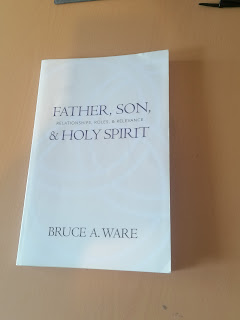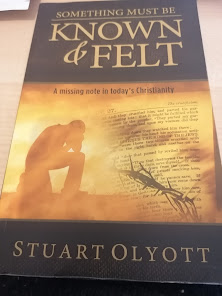Book Review: Father, Son and Holy Spirit.
The book I have chosen to review is a gem. It is Bruce A Ware's "the Father, the Son and the Holy Spirit: relationships, roles and relevance." This work has 6 chapters which explores the doctrine from different vantage points, these chapters are titled beholding the wonder of our Triune God : (1): the importance of the doctrine. (2) historical overview. (3) the Father. (4) the Son. (5) the Holy Spirit. (6) person in relational community. Now each chapter is worth the read even on its own; but taken together it is one of the most stimulating and educational books for one who wants to know more about this wondrous truth. There is one point that must be raised here: not many works give a robust examination of the Old Testament witness to the Trinity. And this may be a problem in and of itself as the Old Testament is replete with evidence. for example, in Isaiah 40-49, we have no less than a half a dozen witnesses to it. To give one example: Isaiah 48:12-18.
Now let us consider some points from this book:
In the first chapter he lays down his motive in these words: "The focus of our study of the Trinity will be examine especially the ways in which the Father, the Son and the Holy Spirit relate to each other, how they relate to us, and what difference this makes to our lives. " (Pg. 14-15) That is a praise worthy pursuit which all true Christians should be encouraged to undertake. While there a many great biblical subjects that should be considered; however, this one is so vital to even understand those other because they flow from this truth in a glorious manner. This first chapter we are given 10 reasons which are as follows: (1) Trinity distinguishes the Faith from others. (2) Trinity is foundational to the Faith. (3) Trinity defines worship. (4) Trinity undergirds prayer. (5) The trinity relationship to sanctification. (6) Trinity hold a unity. (7) Trinity holds a diversity. (8) Trinity has a social relationality. (9) Trinity has an authority-submission element. (10) Trinity provides a dynamic pattern for mankind.
In the second chapter we a historical witness to the doctrine. We start with the question: "why did the Christians come to accept the doctrine of the Trinity?" And this broke down into three parts. (a) scriptural monotheism. (b) scriptural Trinitarianism: the biblical teaching (c) scriptural Trinitarianism: the churches formulation. In all of this we see a very balanced understanding of the foundations for this truth: (1) monotheism. (2) tri-personal. (3) unity and equality. We are told the following: "the Father, the Son, and the Holy Spirit are not identical persons, but they are harmonious in accomplishing the one undivided purpose, one undivided goal, one common work, since they each possess fully the one, undivided essence. So unity and difference, identity and distinction-- this marks the triune nature of God most centrally." (Pg. 42)
In the sixth chapter which is called " persons in relational community." gives us some lessons to apply to our lives and ministries. indeed what have ten important lessons which can help shape our Christian walk as well. And each one is worth considering; but I want to focus on just two: (6) trinitarian roles and marriage: both equality of essence of male and female, and distinction of husband and wife roles are designed by God and reflective of the Trinity. This point is further broken down in this manner: two applications for Husbands and Fathers. and than that is followed by this. two application for wives and mothers. (7) Trinitarian role and the church: both equality of essences and distinction of roles are designed by God to be expressed among pastoral leaders and congregations, and this dynamic is reflective of the Trinity. These two points alone makes this work a great one to read and benefit from.
Let us just note something under point 4 in closing:
We live in a culture that despises authority at every level. Whether the authority of police, or of government, or of parents, or a husband’s authority in marriage, or pastoral authority in our churches – our culture has programmed us to despise authority. We find it hard to think positively about authority for one very simple reason: We are sinners who want to be in charge of our own lives. We want to be captains of our own destiny. We want to govern our own futures. And here, one of the lessons of the Trinity is that God loves what we despise; namely, God loves, exercises, and embraces rightful authority – submission relationships. God loves this authority-submission structure because God embodies this very structure in His Trinitarian relations of Persons. (Pg. 137)

